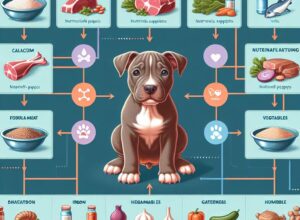
When it comes to feeding our beloved pitbull puppies, we want to provide them with the best possible nutrition. This often leads us to wonder whether we should include vegetables in their diet. After all, vegetables are a staple of human health, so it stands to reason that they could offer benefits to our pups as well. However, it’s crucial to approach this with the right knowledge and understanding of a puppy’s unique dietary needs.
Let’s dive into the world of canine nutrition, particularly for pitbull puppies, and explore whether vegetables should make an appearance in their food bowls.
Key Takeaways
-
Pitbull puppies require a diet rich in protein, but certain vegetables can be a healthy addition.
-
Vegetables can provide essential vitamins and minerals that support a puppy’s growth and development.
-
It’s important to introduce vegetables gradually and in small portions to avoid digestive upset.
-
Some vegetables, like onions and garlic, are toxic to dogs and must be avoided.
-
Always consult with a veterinarian before making significant changes to your puppy’s diet.
Vegetable Nutrition for Pitbull Puppies
Before we start adding a salad to our pitbull puppy’s diet, it’s vital to understand the role that vegetables can play in their overall nutrition. Vegetables are not just fillers; they can be a source of essential nutrients that might not be present in sufficient quantities in meat alone. These nutrients include vitamins like A, C, and K, as well as minerals such as potassium and fiber which aid digestion.
Understanding a Pitbull Puppy’s Nutritional Needs
Pitbull puppies are a bundle of energy and are known for their muscular build, which they develop at a young age. To support their rapid growth and high energy levels, they require a diet that’s rich in protein. However, this doesn’t mean that we should exclude other food groups. In fact, incorporating the right vegetables can enhance their diet by providing a balance of nutrients that support their immune system, vision, and bone health.
Key Vitamins and Minerals in Vegetables

Vegetables are packed with a variety of vitamins and minerals that are beneficial for your pitbull puppy. For example:
-
Vitamin A in carrots helps with vision and immune health.
-
Vitamin C in broccoli can act as an antioxidant.
-
Vitamin K in leafy greens is essential for blood clotting and bone health.
-
Potassium in sweet potatoes supports heart and muscle function.
-
Fiber found in pumpkins aids in healthy digestion.
These are just a few examples of the nutrients that vegetables can offer. The key is to select the right ones and serve them in the appropriate form and amount.
Selecting Safe Vegetables
Now, let’s focus on how to choose vegetables that are safe for your pitbull puppy. Not all vegetables are created equal when it comes to canine health. Some may offer nutritional benefits, while others can be harmful or even toxic.
Top Vegetables for Your Pitbull Puppy
When selecting vegetables for your puppy, opt for those that are known to be safe and healthy for dogs. Some of the best options include:
-
Carrots: They are low in calories and high in fiber and vitamin A.
-
Green beans: These are a good source of iron and vitamins.
-
Pumpkin: It’s rich in fiber and beta-carotene, which converts to vitamin A.
-
Spinach: Although high in oxalates, in small amounts, spinach can be beneficial due to its high nutrient content.
Introduce these vegetables one at a time and in moderation to monitor your puppy’s reaction.
Example: When I first gave Bella, my pitbull puppy, a slice of cooked pumpkin, I made sure it was a small piece to see how she would react. Thankfully, she not only loved it, but it also agreed with her stomach, and now it’s a regular part of her diet.
Vegetables to Avoid and Why
Just as there are safe vegetables, there are also those that should never be part of your pitbull puppy’s diet. These include:
-
Onions and garlic: These can cause anemia by destroying red blood cells.
-
Grapes and raisins: Even in small amounts, they can cause kidney failure.
-
Avocado: It contains persin, which can be toxic to dogs.
Steering clear of these foods can prevent serious health issues for your puppy.
Starting Slow with Small Portions
Introducing vegetables to your pitbull puppy’s diet should be done with care. Start with small portions to ensure that your puppy can digest the new food without any issues. A small bite-sized piece of carrot or a tablespoon of pureed pumpkin is a good beginning. It’s similar to how we humans try a small sample of new food to make sure we don’t have an allergic reaction or dislike the taste.
Keep a close eye on your puppy after introducing a new vegetable. Look for signs of enjoyment or dislike, and more importantly, watch for any adverse reactions such as an upset stomach or diarrhea. If your puppy seems to enjoy and digest the vegetable well, you can gradually increase the portion size over time.
Remember, the key here is moderation. Vegetables should not replace the main components of your puppy’s diet, which are specifically formulated to meet their nutritional needs. Vegetables are a supplement to their diet, not a staple.
Ideal Preparation and Serving Suggestions
When preparing vegetables for your pitbull puppy, cooking them is often the best option. Cooking helps to break down the fibers, making it easier for your puppy to digest. Steaming or boiling vegetables without any added salt or seasonings is the way to go. Once cooked, you can mash or puree the veggies for easier consumption.
Monitoring Your Puppy’s Health
As you introduce vegetables into your puppy’s diet, it’s essential to monitor their overall health and wellbeing. Look for positive signs such as increased energy, a shiny coat, and regular bowel movements. These can indicate that the vegetables are providing beneficial nutrients and fiber to your puppy’s diet.
Signs of Positive Impact
Some signs that vegetables are having a positive impact on your pitbull puppy’s health include:
-
Better digestion and less constipation due to the added fiber.
-
Improved skin and coat quality from vitamins and minerals.
-
Healthy weight management, as vegetables can help them feel fuller without excess calories.
These benefits can contribute to your puppy’s overall health and happiness.
Watching Out for Adverse Reactions
While vegetables can be a healthy addition to your puppy’s diet, not all dogs will react the same way. It’s crucial to watch out for any signs of an adverse reaction. Symptoms to be aware of include:
-
Vomiting or diarrhea
-
Excessive gas or bloating
-
Changes in appetite or water consumption
If you notice any of these symptoms, it’s important to stop feeding the new vegetable and consult with your vet. They might recommend a different vegetable or adjust the portion size.
For instance, when I introduced spinach to a young pitbull named Rocky, he experienced some mild digestive upset. We decided to eliminate spinach from his diet and replaced it with green beans, which he tolerated much better.
The Right Balance in Your Puppy’s Diet
Finding the right balance in your pitbull puppy’s diet is crucial. While vegetables can provide beneficial nutrients, they should not take the place of high-quality puppy food that’s formulated to meet their developmental needs. The majority of your puppy’s diet should consist of protein to support their growth, with vegetables acting as a supplement for additional vitamins and fiber.
How Vegetables Complement Commercial Dog Food
Vegetables can complement commercial dog food by providing additional nutrients that may be present in lower quantities in the food itself. For example:
-
Leafy greens can boost the vitamin content.
-
Carrots can provide beta-carotene, which is good for eye health.
-
Pumpkin can aid in digestion with its high fiber content.
These additions can help round out your puppy’s diet, making it more complete.
It’s also important to note that while vegetables are a great addition, they should not exceed more than 10% of your puppy’s daily caloric intake. This ensures that they are getting the right amount of protein and other nutrients that are critical for their growth and health.
When to Consult a Vet about Your Puppy’s Diet
If you’re unsure about the types of vegetables to include in your puppy’s diet or the correct portions, it’s always best to consult with a veterinarian. They can provide guidance based on your puppy’s specific needs, breed, and health status. It’s particularly important to speak to a vet if your puppy has any pre-existing health conditions or if you notice any adverse reactions after introducing new foods.
Vegetables as Treats and Training Tools
Beyond their nutritional value, vegetables can also be fantastic treats and training tools for your pitbull puppy. They are low in calories compared to many commercial treats and can be just as satisfying. Using vegetables as rewards during training sessions can reinforce good behavior without the risk of weight gain associated with overfeeding high-calorie treats.
Some puppies may be more motivated by the crunch of a fresh carrot or the novelty of a green bean. Experiment with different vegetables to find out what your puppy likes best. Just remember to account for these treats in your puppy’s overall daily food intake to maintain a balanced diet.
Engaging your pitbull puppy with vegetables as part of their diet and training routine can be a rewarding experience for both of you. It’s a way to ensure they’re getting a variety of nutrients while also strengthening your bond through positive reinforcement. As always, keep your vet in the loop and enjoy discovering the world of healthy, veggie-based treats with your furry friend.
Vegetables as Treats and Training Tools
Vegetables aren’t just for dinner; they can also be effective as treats and training tools for your pitbull puppy. Using vegetables in this way can add an extra layer of nutrition to your puppy’s diet while also reinforcing positive behavior. Let’s explore how you can incorporate veggies into your training routine and what makes them such a smart choice for rewards.
Healthy Reward Alternatives
Traditional dog treats are often high in calories and can contribute to weight gain if used excessively. Vegetables, on the other hand, are a low-calorie alternative that can still be very appealing to your puppy. They can be used as a healthy reward during training sessions or as a little extra something to show your puppy love. For example, a baby carrot, a slice of cucumber, or a small piece of steamed green bean can be just as exciting as any store-bought treat, with the added benefit of vitamins and fiber.
Creative Ways to Use Vegetables in Training
Getting creative with vegetables can make training sessions both fun and nutritious. Try hiding a small piece of vegetable under a cup for a ‘find the treat’ game, or use a slice of sweet potato as a puzzle piece in a treat-dispensing toy. You can even freeze some vegetable puree in an ice cube tray for a refreshing summer treat that doubles as a training reward. By using vegetables in different forms and games, you’re enriching your pitbull puppy’s training experience and keeping them engaged and eager to learn.
Frequently Asked Questions
As a responsible pet owner, you’re bound to have questions about incorporating vegetables into your pitbull puppy’s diet. Here are some common queries answered to help you navigate this aspect of puppy care.
Can pitbull puppies be allergic to certain vegetables?
Yes, pitbull puppies, like any dogs, can have allergies to certain vegetables. It’s essential to introduce new vegetables one at a time and watch for any signs of allergic reactions, such as itching, swelling, or gastrointestinal upset. If you suspect your puppy has an allergy, consult your vet immediately. They may recommend an elimination diet to determine the cause of the allergy.
How much vegetables can my pitbull puppy eat daily?
Vegetables should make up no more than 10% of your pitbull puppy’s daily caloric intake. This ensures that the bulk of their diet is still made up of high-quality puppy food that provides the necessary nutrients for their growth and development. Always chop vegetables into small, manageable pieces to prevent choking and aid in digestion.
Are there any vegetables that can be toxic to dogs?
Yes, some vegetables are toxic to dogs and should be avoided completely. These include onions, garlic, and chives, which can cause gastrointestinal irritation and lead to red blood cell damage. Rhubarb leaves and wild mushrooms can also be harmful. It’s best to stick to vegetables known to be safe for dogs and always consult your vet if you’re unsure.
Can puppies eat raw vegetables or should they always be cooked?
While some vegetables can be given to puppies raw, such as carrots and cucumbers, many are easier to digest when cooked. Cooking vegetables can break down tough fibers and make the nutrients more accessible. Avoid adding any seasoning or oil. Always ensure the vegetables are cooled to room temperature before offering them to your puppy.
Should certain vegetables be avoided during a pitbull puppy’s growth stages?
During growth stages, it’s essential to focus on providing your pitbull puppy with a balanced diet that supports their development. While vegetables can be part of this balanced diet, it’s important to avoid those high in oxalates, such as spinach, which can interfere with calcium absorption when fed in large amounts. Always prioritize high-quality puppy food and use vegetables as a supplementary treat rather than a main component of their diet.
Incorporating vegetables into your pitbull puppy’s diet can be a healthy and enjoyable way to add variety and nutrition. By choosing the right vegetables, preparing them safely, and consulting with your vet when necessary, you can ensure that your puppy grows up strong, healthy, and well-trained. Remember, the journey of raising a happy and healthy pitbull puppy is not just about what they eat, but also about the love and care you provide every day.



